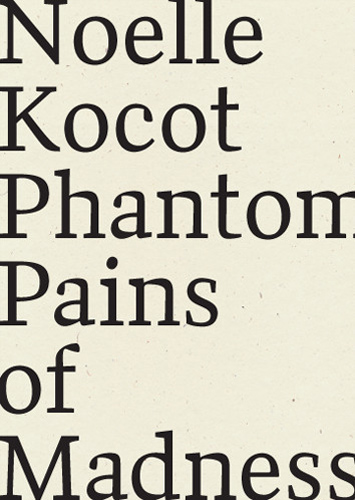Phantom Pains of Madness
Phantom pain is one of those peculiar syndromes that has received widespread recognition for its oddness, mostly. Noelle Kocot’s Phantom Pains of Madness trickles and drips with oddity as well, the entire piece written one word at a time. Each word receives its own line, which makes the book very easy to read: a delight in the modern age. It also gives the book a dimension and heft that is incomparable. But Noelle’s humor disarms the reader often and keeps the book light, while its content is quite heavy. This is her seventh book of poetry, and there is no doubt that she has achieved a wringing out of all that isn’t her. Phantom Pains of Madness is a truly original work and a very rewarding read. Phantom pain is one of those peculiar syndromes that has received widespread recognition for its oddness, mostly. Noelle Kocot’s Phantom Pains of Madness trickles and drips with oddity as well, the entire piece written one word at a time. Each word receives its own line, which makes the book very easy to read: a delight in the modern age. It also gives the book a dimension and heft that is incomparable. But Noelle’s humor disarms the reader often and keeps the book light, while its content is quite heavy. This is her seventh book of poetry, and there is no doubt that she has achieved a wringing out of all that isn’t her. Phantom Pains of Madness is a truly original work and a very rewarding read.
In “The Ache That Never Goes Away,” Noelle states:
So
What
The
Fuck
Is
That
Supposed
To
Mean
This is regarding an earlier grouping of words—or lines rather—that says “you have changed forms.” Kocot is chewing her cuticle and pondering the squeegee. After much thought about the disorder, she says “I’ll just go ahead and take this pill and then I’ll be as right as the soft winter rain.” But that heavy f-word lingers through the whole piece. What does this mean? What is she discussing in her head and who does it pertain? It is a great introductory to the humanity and talkish manner of the following poems.
“Limitations” boasts an inspiring line in a book about the pains of remembering madness. As the book moves and the narrator recalls more and more of relationships and victories won and lost, it easy to succumb to a somewhat jaded nature. But Kocot interjects a great triumph early on in her recollection in saying:
I / Am / Telling / You / The / Truth / That / The / Limitations / Were / All / Pure / Lies
Lines like this allow the reader to understand what Kocot means when she talks about madness later in her poem “Crazy.” In this she recalls “Tainted Black Prairie Soaked In Oils” which seems a rich metaphor. It conjures up images of Sam Mendes’s desert vision of the lighting of the oil fields during Desert Storm, the sort of black and fiery crazy that will truly scrape away time and its passing problems. “It / Is / A / Holy / Feeling / Somehow / This / Freedom” begins to make sense over time. Crazy is a purge. It is a cleansing of the spirit. The blackness of the oil becomes a freeing palate and a way to start again.
Still the book evolves with irrationality and sense to counter it. One of the funniest and most relatable lines appears in “Record Keeper” in which Kocot states that “I / Believe / I / Will / Be / Fired / For / No / Reason / From / My / Job.” We all have these fits of doubt and uncertainty on occasion, regardless of the subject or content. This is a flight of insecurity and irrationality that Kocot must face.
A new ideology creeps in near the end of the work. “Reform” has a satisfying line that states:
We / Didn’t / Know / Before / And / It / Wouldn’t / Be / Difficult / To / Say / We / Don’t / Know / Now / Either
These are the sorts of lines that make the “bullet in the heart burst into a flower.” Those memories and words that have hung in hearts and minds as error become the very essence of being over time. “Maybe I is multiple” becomes the sentiment near the end of the book, which is to say that all these little minor eruptions become interwoven and many. The substance is in the matriculation of the one word, one line, poems. They continue to move ahead.
The book pushes forward one foot at a time in the most literal poetic sense. And therein enters this sense that life is unfolding. There is no need for rigidity. Kocot has learned to parse the planet and her world one unit at a time. This is the most appealing and noteworthy part of the book. A commitment, to never falter from the solution and layout to the work. In this, the connection can be seen between Phantom Pains and the human experience and the way in which quality art moves us between.





